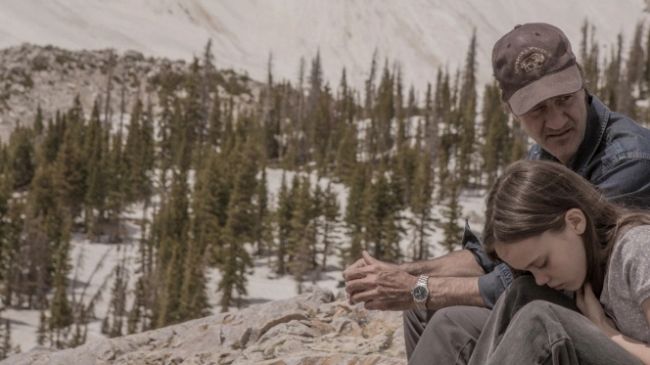“I think I might be an awful person,” confesses 47-year-old David Lamb to Tommie, his 11-year-old traveling companion, and certainly the optics don’t look good for him. David has picked up Tommie at a strip-mall parking lot and whisked her away for a week-long trip to a cabin in the mountains that both of them know is going to last much longer than a week. David makes up aliases — she calls him “Gary,” he calls her “Emily” in certain situations — and they agree on various stories to tell strangers if they’re ever asked questions about their relationship. By all appearances, however, he has kidnapped her, even though their arrangement isn’t what it seems. The truth is, we don’t entirely know Gary’s motives or his endgame, and if he’s indeed an awful person, neither Gary nor Tommie nor the audience know the exact nature of his awfulness.
Ross Partridge’s unsettling drama Lamb, based on Bonnie Nadzam’s novel, leaves this agonizing question to linger over the action for most of the way, which isn’t quite as cruel a proposition as it seems. That initial threat of sexual violence starts to dissipate the longer David and Tommie are on the road, replaced by a different kind of tension, one that has more to do with the psychological well-being of both parties than the sick possibility of abuse. Their road trip together remains wildly inappropriate, much as he labors to reassure her of their “partnership,” but Lamb isn’t in any hurry to reveal how inappropriate it might be or how it might be resolved. Not even David understands exactly what he’s doing; he’s just following some mysterious compulsion from deep within his twisted soul.
Partridge, who adapted the book, also stars as David, a broken man who’s just suffered through the loss of his demented father and the end of his marriage. He’s been having a secret affair with a college student (Jess Weixler) and living out of a motel, and though his boss is vague about his screw-ups at work, David has been ordered to take a little time off and get his head straight. In a parking lot, David recognizes a kindred spirit in Tommie (a superb Oona Laurence), a lonely and neglected kid who’s been dressing in provocative clothes and testing her boundaries. As she approaches David in high heels and a shirt stapled into a midriff, she resembles a younger version of Jodie Foster‘s Iris in Taxi Driver, and he has the Travis Bickle instinct to protect her from the “friends” who put her up to it and the not-so-nice guys who could take advantage of her.

After meeting a few times, David proposes a trip to the mountains, but he’s careful to make sure she wants to go: If she doesn’t, he insists that she take the cab money on the table and go. Of course, no 11-year-old child can freely make a decision like that, even one as self-possessed and thoughtful as Tommie. David tells her she can go home any time she wishes, but there’s plenty of evidence that her freedom of choice is illusory and their fake father-daughter adventure is really an abduction. David is earnest and plainly cares about her, but he’s also deeply unstable and seems to be acting out on some secret impulse that not even he fully understands. And that makes him dangerous.
So what’s the deal with this guy? Lamb eventually arrives at an answer, which is almost always a losing strategy for a psychological drama, because all its carefully guarded mysteries can vaporize in a single monologue. There’s no one skeleton key that can unlock the door of human behavior, and in David’s case, there’s a degree to which he’s unknown even to himself. Having him explain why he feels a special connection to Tommie doesn’t entirely derail the film, but it does make it seem needlessly coy about what makes David tick.
Still, Lamb is undeniably audacious in taking David and Tommie’s relationship as far as it does without veering into child-in-peril exploitation. Partridge makes the most of his locations, too, especially when the film heads into the gorgeous, unpopulated expanses of mountains and fields, which reflect the head space of two characters who feel alienated from the rest of humanity. And though the film explains away too much of David’s troubled psyche, there’s still enough intrigue left in how Lamb will wrap up a journey that has no clear or comfortable destination. For David and Tommie, the thought of running away has great appeal. It’s coming back that’s hard.
Lamb is now playing in select theaters nationwide and is also available via On Demand and iTunes.






